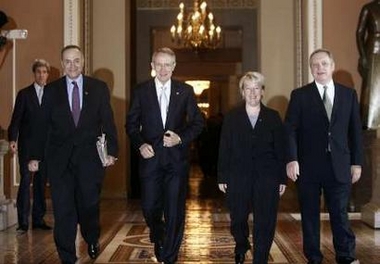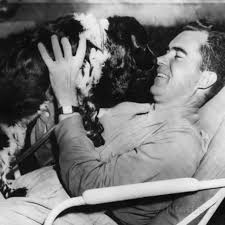Explaining Carville
Thursday, November 16th, 2006I think I know where James Carville is coming from. Understand, I don’t think it is a good place or one that could lead to a constuctive place for the Democratic Party, but I can slice together the disparate bits from the “James Carville — Howard Dean” feud and come to this explanation.
I saw a quip that Carville has a, quote-in-quote, 50 state strategy. And I suppose he does. We are dealing with egos here, and the end result is that we are dealing with two different electoral maps here.
I remember once leafing through what I presume is the latest book by he and Begala. Understand I don’t see any real reason to read any book by Paul Begala and James Carville (I think the book Carville wrote with Mary Matalin on the 1992 election is worth reading), as they strike me as unsubstantial pamphlets. They appear to have striked up a cottage induistry of these quick mid-level political books, and I expect one to be churned out fairly shortly. What I remember seeing in leafing through this book was comments on the difference between Clinton’s map in 1992 and the coastal enclaves that have befallen Gore and Kerry.
James Carville’s mental image for Democratic Party success is essentially a recreation of the 1992 and 1996 map for Clinton. This makes some sense, as it befits his Louisiana up-bringing, and the ghosts tugging from the Solid South, and his political success as political strategist.
Look at the electoral maps for 1992 and 1996. Clinton won Georgia, Tennessee, Kentucky, and Louisiana, and West Virginia. Barring a fairly large political landslide, the next Democratic presidential candidate is not going to win these states. The election shifts in the map are quite striking: Virginia just well might be the deciding state in the next presidential election, says Larry Sabato.  In 1992, it was as far off Carville’s map as any other state. (Ditto, say, Nevada.)
So I understand Carville’s 2000 suggestion that Gore choose Zell Miller as a running mate. And I understand why he wants to replace Howard Dean with Harold Ford, Jr. Toss these two candidates with Clinton, and you have this triangulation strategy of mish-mashing and weaving together traditional Republican and traditionally Democratic themes and grasping for a political center, which appears to be what James Carville would have a Democratic Party do from here on into eternity. I have no doubt that Ford ran as good a campaign as any Democrat could in Tennessee, but the landscape was not particularly good. Tellingly enough, Ford lost his election. And I will note that while famously the Democrats won re-election for every Senate, House, and Governor race, the cloest calls were a couple of House races in Georgia.
Meanwhile, while James Carville is stuck with his old electoral map, the Republican Party grapples with the shifting electoral map.Â
That more or less leaves the GOP with a majority it has the potential to turn out only in the South. And unless Republicans are content to be a regionally strong minority party, they need to do something different.
Howard Dean’s comment: ” This is some kind inside the beltway silliness.” Move along, nothing to see here, interesting only because I can dissect what the heck a James Carville is.





